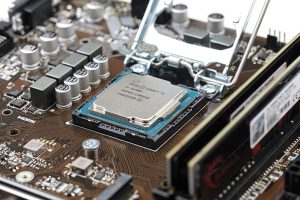BLOOMBERG
Intel Corp Chief Executive Officer Pat Gelsinger, plotting a comeback for the once-dominant chipmaker, made the case that the company’s technology will be vital to an industrywide boom in artificial intelligence computing. Speaking at Intel’s annual Innovation conference, Gelsinger pointed to advances that his company is making in production technology and software developer tools for AI. The opportunity will only grow as more artificial intelligence capabilities are powered by personal computers, he said.
“AI represents a generational shift, giving rise to a new era of global expansion where computing is even more foundational to a better future for all,” Gelsinger said. “For developers, this creates massive societal and business opportunities to push the boundaries of what’s possible, to create solutions to the world’s biggest challenges.”
Gelsinger is trying to fire up interest in Intel’s technology and return to an era when its annual conferences offered a road map for the whole computing industry. He argues that artificial intelligence use won’t be confined to the data centres of giant cloud providers, which rely heavily on chips from Nvidia Corp. Instead, it will fan out into new areas, including the now-moribund PC market.
Intel’s leader reiterated a pledge to upgrade its manufacturing technology at an unprecedented pace. As part of that push, a chipmaking technique called Intel 3 will be ready for introduction at the end of this year, he said.
Earlier missteps by Intel allowed Taiwan Semiconductor Manufacturing Co and Samsung Electronics Co to overtake the company in manufacturing prowess. More recently, Nvidia has stolen the spotlight as the main provider of AI accelerators — processors that help handle artificial intelligence workloads. Intel has made some headway with its own accelerator efforts, Gelsinger said, and its Gaudi2 product line even has an edge in some areas.
Gelsinger also said that new Intel Core Ultra processors will include the first integrated “neural processing unit,” something that will help speed up AI software in PCs. The first versions of the chips will be available in computers starting in December.
In addition to trying to catch up with rivals, Gelsinger is opening up his factory network to outside customers — even if they compete with Intel’s products. But this push into the so-called foundry business will require Intel to show that it has cutting-edge manufacturing again — something Gelsinger has promised will happen by 2025.
Software developers that are interested in Intel’s forthcoming products will get an early chance to try out their projects using the chipmaker’s Developer Cloud. That service lets users test their workloads over the internet on Intel-hosted computers.
 The Gulf Time Newspaper One of the finest business newspapers in the UAE brought to you by our professional writers and editors.
The Gulf Time Newspaper One of the finest business newspapers in the UAE brought to you by our professional writers and editors.
